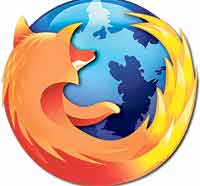The past few weeks saw the release of Google's own browser – Chrome (beta) and Microsoft Internet Explorer (IE) 8 (beta) to rival Mozilla's Firefox 3. Finally it seems that browser technology is now getting the competitive push it deserves.
With Internet access becoming faster, more affordable and ubiquitous the web browser is taking centre stage as one of the most important applications on your personal computer. Even in its infancy, web 2.0 technologies has shown that it is capable of delivering applications such as word processing and spreadsheets via the Internet and here, the browser and access speed are unarguably the two key factors that contribute to a positive user experience.
 |
Mozilla Firefox, the most successful challenger to Microsoft's Internet Explorer, is an outstanding piece of work and more than deserving of the market share that IE has acquired simply as a result of being bundled in with MS Windows. But Mozilla does not have a monopoly on all the bright ideas in browsing anymore and if you are looking for better ways to browse the web, you have two new options. One comes from Microsoft, which two weeks ago shipped an impressive, but unfinished, release of IE's next version. The other comes from Google, which last week offered a preview of its own browser. Internet Explorer 8 Beta 2 and Google Chrome (beta) each show thoughtful attention to the ways busy people who don't read manuals try to read the Web. Both browsers are free downloads for Microsoft's Windows XP or Vista, though Google says it's working on Mac and Linux versions of Chrome.
IE 8 catches up with two of Firefox's best conveniences - the auto-complete function that takes you to recently visited pages whether you type their address or their title and the "find as you type" searching that jumps to matching text on a page as you type your query. It also adds useful tweaks of its own. IE 8 also tints the tabs of pages opened from each site in a particular colour to help you identify those tabs more easily as you sift through them. The blank page that loaded when you opened a new tab in IE now features links to pages you've viewed and web services such as mapping and word-translation sites that you can invoke with a right-click. There's also "InPrivate browsing," an option that, like the "private browsing" in Apple's Safari, lets you visit sites without the browser keeping any record of your activity there. IE 8 also adds sturdier defences against hostile Web sites and some performance tune-ups, though it's still slower and it uses more memory than Firefox.
 |
Google's Chrome shares some features with IE 8 and Firefox, such as smart address auto-completion and find-as-you-type searching. But it's far simpler than either, tossing aside many browser traditions. Chrome dispenses with the usual line up of address bar and search bar; here, you type either a site's address or words to describe the site you want. Chrome is smart enough to know the difference. This absence of clutter could make Chrome the perfect starter browser - if only it came pre-installed on a new computer. Chrome matches Safari's private browsing and IE 8's InPrivate option with a similar mode, "incognito" but it leaves out common features such as support for the RSS (Really Simple Syndication) updates offered by many sites and the add-ons and extensions you can use to customize IE and Firefox. The biggest issue with this browser however is the brand name. Google does some great work, but do you want it providing all of your Internet experiences? Would you eat breakfast, lunch and dinner at the same restaurant? In that light, the best feature of Chrome may be its open-source code, free for anybody to inspect and improve.
Both IE 8 and Chrome attempt to cure a common ailment of Web browsing by running separate pages in separate blocks of code so that when one page crashes, you can keep viewing any other pages you have up. That technique eats a fair amount of memory, but as memory gets cheaper, this trade off may not seem so bad. Still, I wouldn't advise anyone to dump Firefox for either of these just yet, but I'm certainly looking forward to seeing what developers at Mozilla do to top these releases. The browser market can only get more interesting from here on. |


